Managing bids and proposals is a critical part of any contractor’s business, serving as the foundation for success across the entire project life cycle.
Dedicated bidding software helps construction professionals – from general contractors to specialty subcontractors – streamline the bidding process, track opportunities, and win more jobs.
The following are the ten best contractor bidding software tools. Each tool is presented with who it’s best for, key features, pros and cons, and a brief note on pricing to help you compare quickly.
Note: If you're tired of digging through emails, missing deadlines, and manually tracking bids, then try Downtobid. Automate bid invitations, use our verified network, and win more work with less effort. Click here to sign up for a demo.
Key Takeaways
- Bidding software automates bid tracking and stops contractors from missing deadlines.
- AI tools automatically pull bid invitations from email into organized dashboards.
- Network platforms provide access to large databases of qualified subcontractors.
- Enterprise tools combine bidding with full project management capabilities.
- Basic features are often free, but full functionality costs $150-500+ monthly.
1. Downtobid
Best for: Subcontractors and suppliers looking to automate bid invitations and tracking.
Downtobid is an AI-powered construction bidding software that automatically pulls bid invite emails into a centralized dashboard.
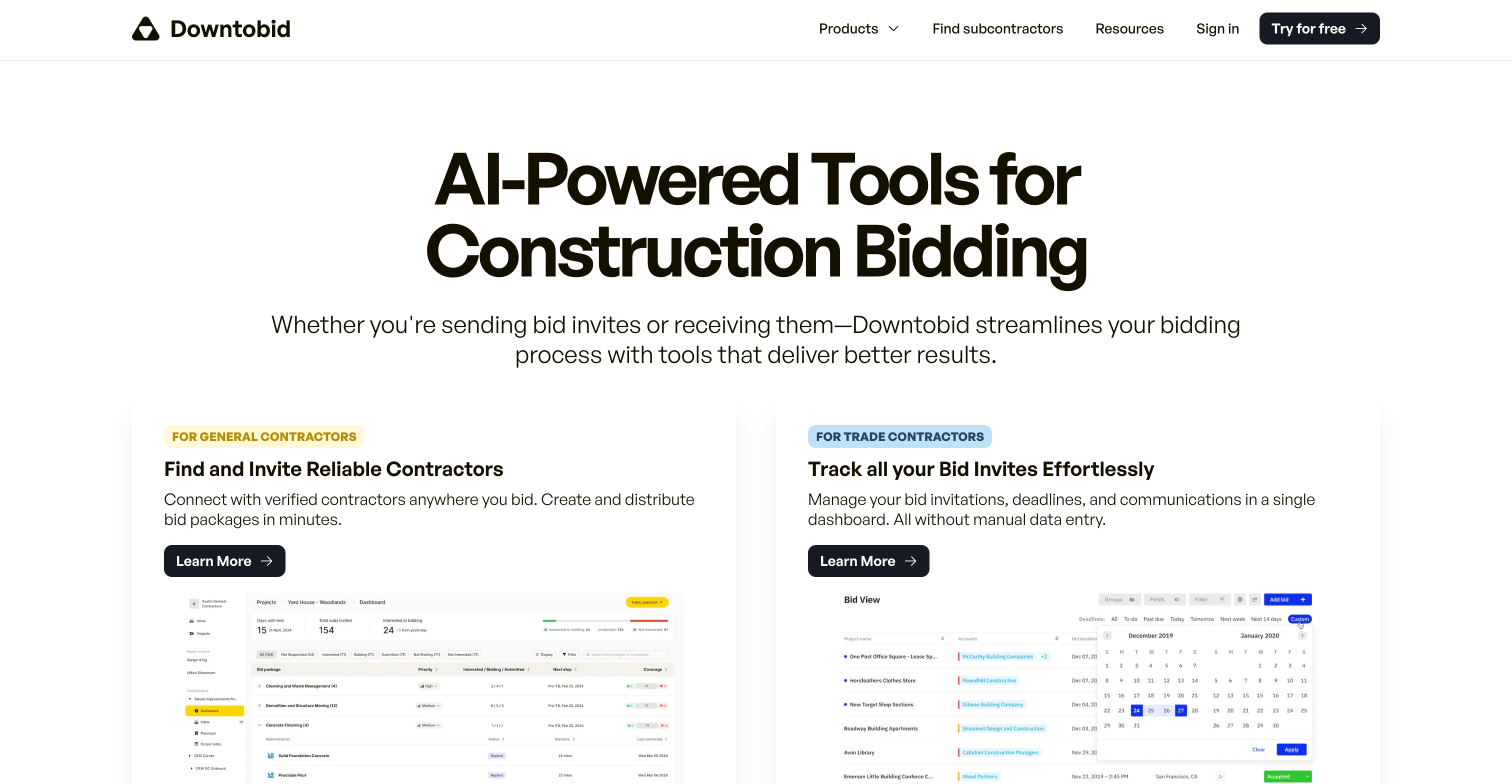
It eliminates tedious manual tracking by organizing incoming bids, deadlines, and project details in one place. Teams can set custom filters to see only relevant projects and get calendar reminders so nothing falls through the cracks.
Key Features:
- Automated Email Integration: Connects to your email (e.g. Outlook) to auto-import and categorize bid invitations in real-time.
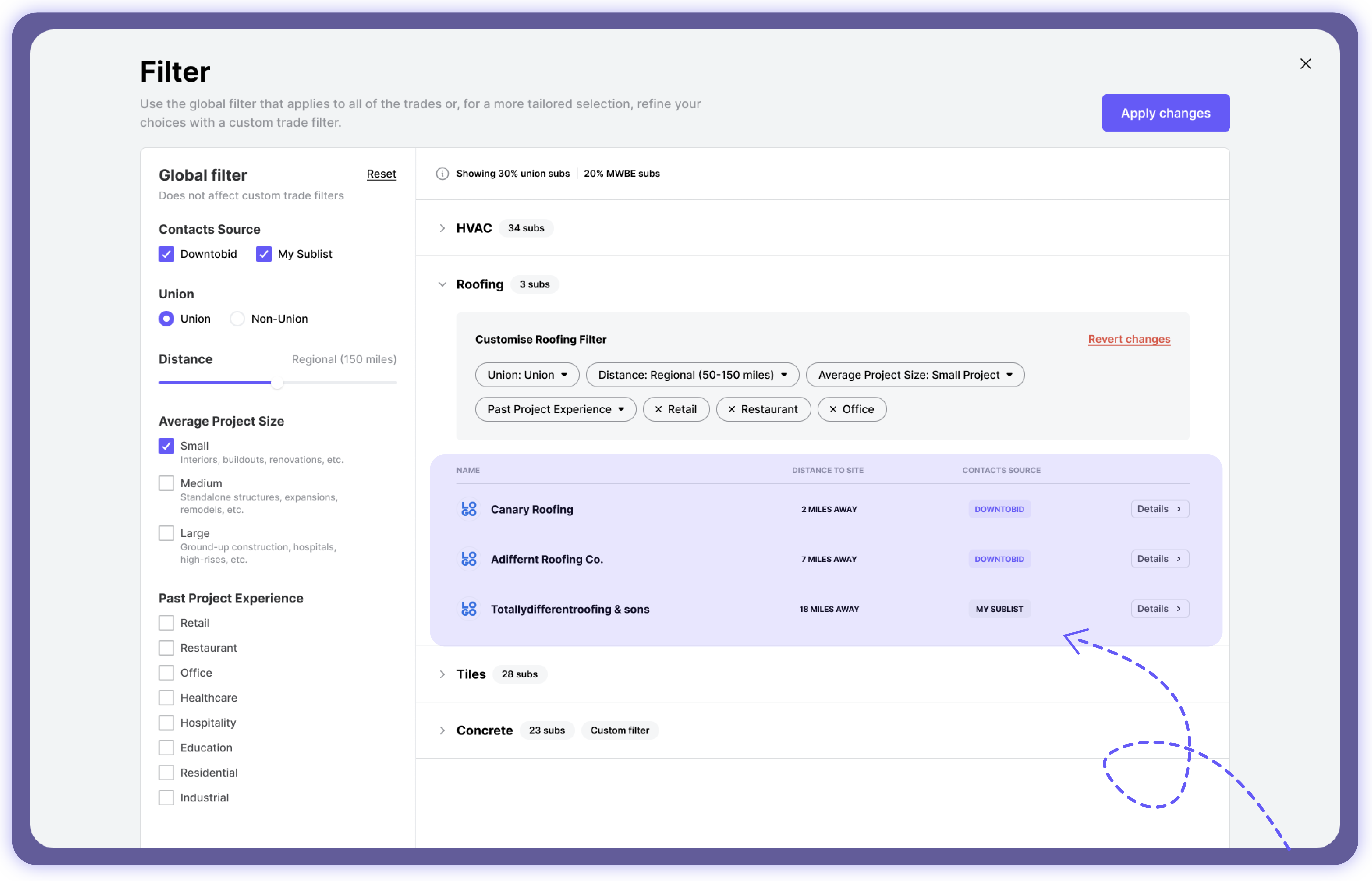
- Centralized Bid Dashboard: Provides a single view to manage all bids with statuses (undecided, accepted, etc.), deadlines, and project info, improving organization and visibility.
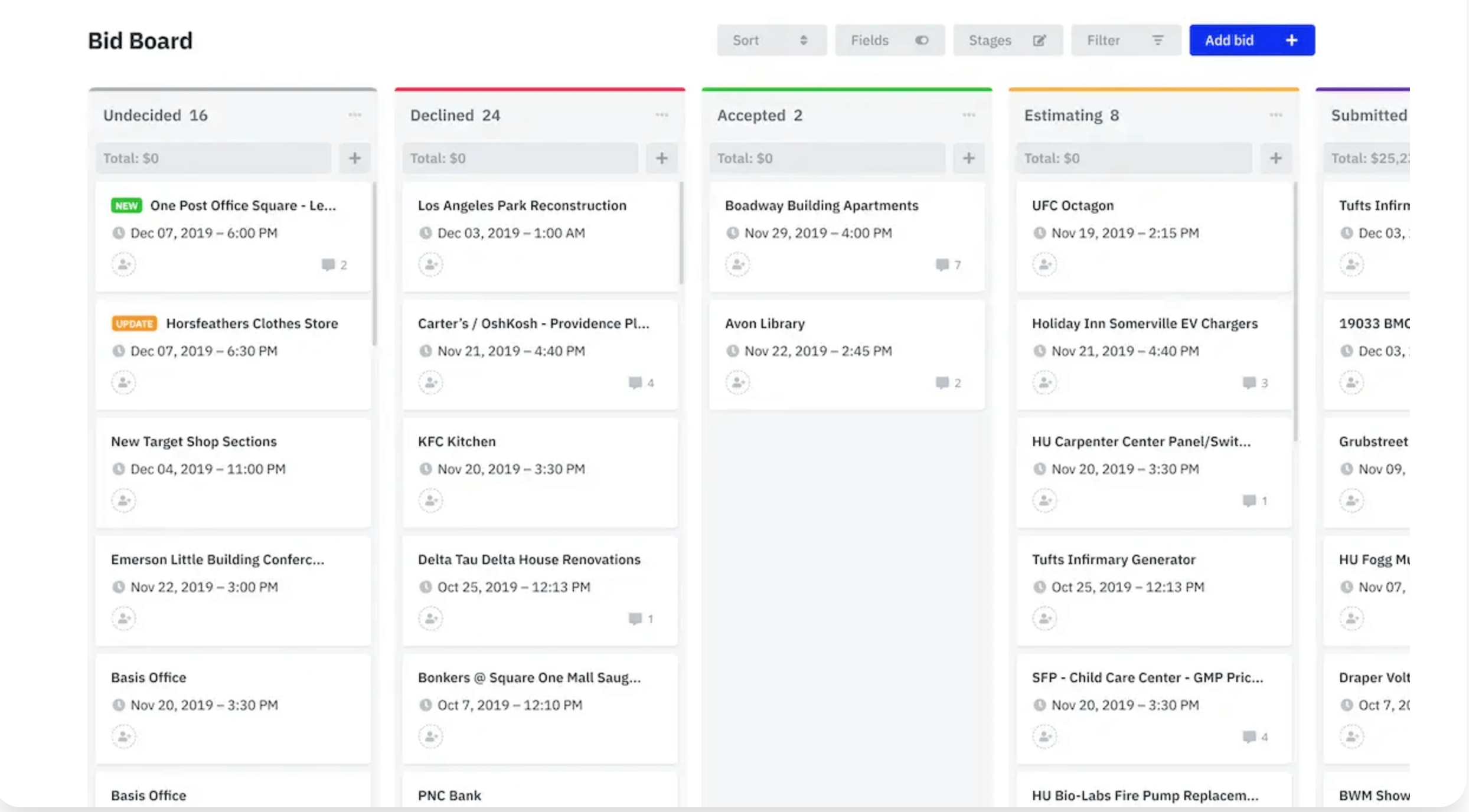
- Custom Filters & Alerts: Allows setting rules (by project type, location, GC, etc.) to highlight relevant opportunities, plus calendar sync and notifications for due dates to ensure you never miss a deadline.
Pros:
- Significantly saves time by eliminating manual data entry and bid tracking.
- Filters out unqualified projects, so contractors focus only on suitable bids.
- Enhances team collaboration with built-in communication and analytics tools.
- Updated subcontractor network
Cons:
- Focused on bid management (not a full construction project management software suite).
- Email integration required, which may need initial setup (currently optimized for standard email clients).
- Newer platform, so your clients or partners may not all be on it yet (smaller network effect than older tools).
Pricing:
Downtobid offers two main pricing tiers:
Starter Plan ($150/month): Includes unlimited active projects, support for up to 3 users, and a dedicated bid coordinator. Designed for smaller construction companies or those new to the platform.
Pro Plan ($500/month): All Starter Plan features plus support for up to 10 users, sublist cleanup and migration services, and access to Downtobid's full subcontractor database. Built for medium to large construction companies managing complex projects.
(Free demos/trials are available on request. Click here to sign up.)
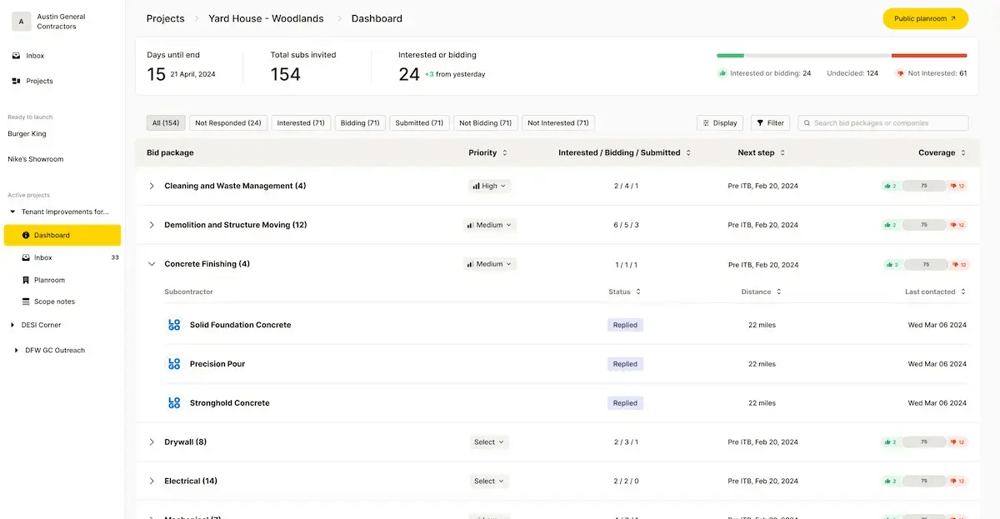
2. FollowUpCRM
Best for: Specialty contractors (e.g. subcontractors) who need to track bids as part of their sales pipeline.
FollowUpCRM is a cloud-based construction CRM focused on bidding and sales follow-ups. It helps contractors organize leads, bids, and client communications in one system to improve bid win rates.
Key Features:
- Sales Pipeline Tracking: Combines bid tracking with CRM capabilities, so you can manage leads, bids, and follow-up tasks in one place. You can compare FollowUpCRM's bid board vs Downtobid here.
- Email & Calendar Integration: Connects with email clients (like Outlook) to log communications and set bid reminders, ensuring timely follow-ups.
- **Reporting Dashboards: **Offers visual reporting on bids and sales performance, helping contractors forecast revenue and identify which bids need attention.
Pros:
- User-friendly interface designed for contractors, requiring little training.
- Integrates with common email/calendar tools for seamless communication tracking.
- Helps ensure no bid falls through the cracks by managing follow-up tasks and reminders.
- Rated one of the best sub CRM softwares
Cons:
- May have scalability limits for very large firms or complex projects.
- The mobile app and on-the-go features are somewhat limited in functionality.
- Pricing can be on the higher side for the full feature set (especially for smaller contractors).
Pricing: FollowUpCRM offers multiple plans (Starter, Team, Professional, Enterprise) but does not publicly list prices. You’ll need to contact their sales team for a quote or to get a demo of the plan that fits your business. Find out more here.
3. BuildingConnected
Best for: General contractors and large subcontractors seeking access to a huge network of construction professionals.
BuildingConnected (part of Autodesk) is a widely-used platform for managing bid invitations. GCs use it to send ITBs (Invitations to Bid) to qualified subs, and subcontractors use it to find projects and submit bids – all through a centralized interface.
Key Features:
- Vast Subcontractor Network: Access one of the construction industry’s largest databases of subcontractors and vendors, making it easier to find qualified bidders for any trade. Compare the Downtobid network vs BuildingConnected subcontractors here.
- Bid Management & Comparison: Easily send bid invites and then compare received bids side-by-side within the platform to make informed award decisions.
- Centralized Communication: Keep all bid-related messages and documents in one place. Everyone involved (estimators, subs, etc.) can communicate through the platform, reducing miscommunication.
Pros:
- Leverages a large network for wider subcontractor reach on projects.
- Provides automation and templates that speed up ITB workflows, improving efficiency.
- Improves collaboration by housing all bid communication and files together (as part of Autodesk Construction Cloud).
Cons:
- Learning curve for new users due to the breadth of features and Autodesk integration. The difficulty of use has users searching for different Building Connected options.
- The free version has been discontinued, so no cost-free tier for small projects.
- Integrating BuildingConnected with other project management tools can be challenging at times.
Pricing: BuildingConnected now offers a single Pro plan (after retiring its free plan). Pricing for BuildingConnected is customized — typically based on company size and needs (e.g. number of users/estimators) — and available by quote only. Users must contact Autodesk’s sales for specific pricing details.
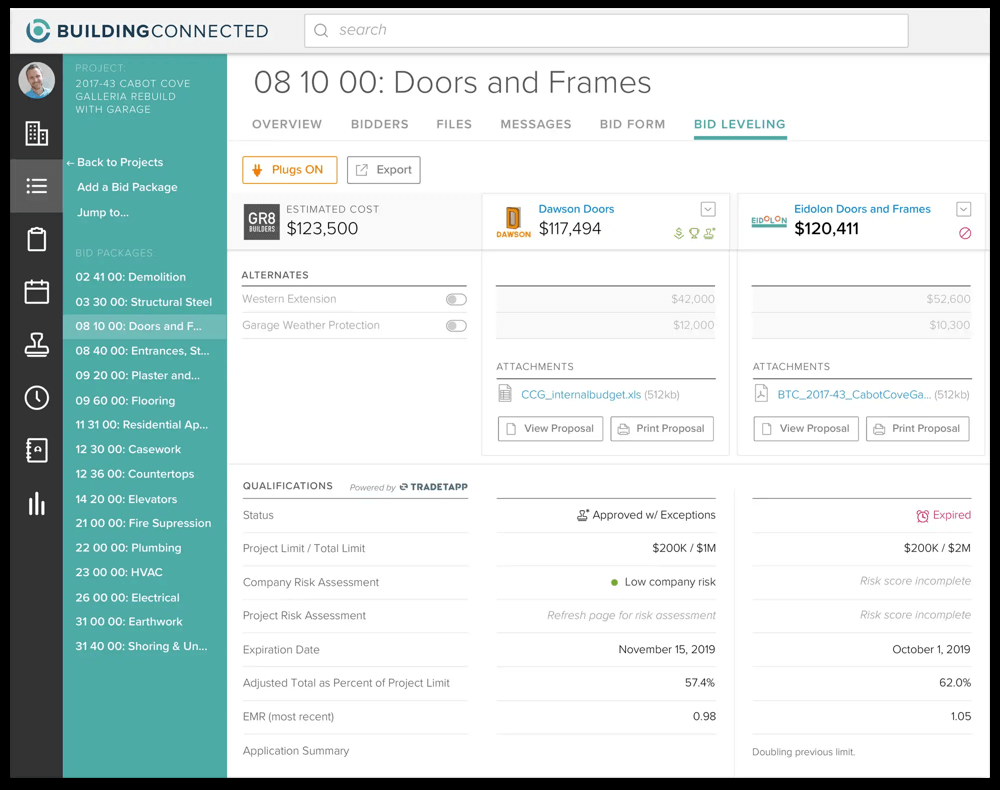
4. ConstructConnect Bid Center
Best for: Contractors seeking project leads and a combined bid management solution. ConstructConnect Bid Center is part of the ConstructConnect platform, known for its construction project databases. Bid Center helps subcontractors and suppliers quickly review incoming bid invitations and find new opportunities, all integrated with ConstructConnect’s project information.
Key Features:
- Email Invite Integration: Similar to other bid boards, it automatically pulls bid invitations from your email into a single platform, so you can review and respond without digging through emails.
- Centralized Bid Board: Manage all your bids (incoming and outgoing) from one dashboard – track bid status, due dates, and which projects you’re bidding on in one view.
- Collaboration Tools: Includes basic communication and document sharing features so multiple team members can work together on bid responses and see updates in real time.
Pros:
- Time-saving automation by importing ITBs directly from email and organizing them for you.
- Keeps you on schedule with built-in deadline tracking and reminders.
- Straightforward interface that’s relatively easy to navigate for most users.
Cons:
- Limited customization in how you organize or categorize bids compared to some newer tools.
- Users may face a learning curve integrating it with other software in their workflow.
- Reporting and analytics features are basic; heavy analysis might require exporting data. These basic reporting features may make ConstructConnect not worthwhile.
Pricing: ConstructConnect Bid Center does not list pricing publicly. Interested companies should contact ConstructConnect for pricing. They do offer a free demo so you can try out the software’s features before purchasing.
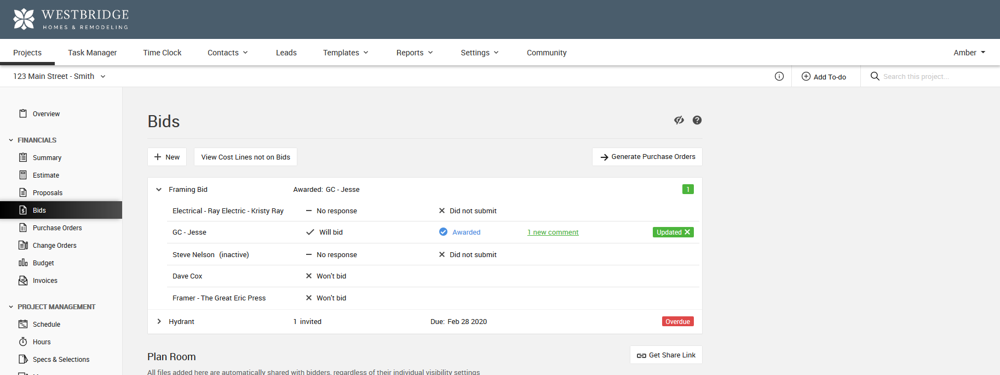
5. Construction Bid Source
Best for: Small contractors and subcontractors looking for a simple way to find bid opportunities.
Construction Bid Source is essentially a lead board that connects subs with available construction projects. It provides daily updated listings of bids and lets users filter projects to find ones that match their trade and region. Learn more here.
Key Features:
- Customized Project Search: Users can filter and search projects by criteria like location, project type, size, and budget to find the most relevant opportunities.
- Document Access: The platform provides access to project bid documents (plans, specs, addenda) for review so you can decide quickly if you want to bid.
- Daily Opportunity Alerts: Subscribers receive daily updates on new project listings that fit their specified trade or criteria, ensuring you’re always aware of fresh leads.
Pros:
- Easy access to bid documents and project details without complicated software.
- Lets you perform targeted searches to find just the right types of jobs.
- Regularly updated listings mean a steady stream of potential projects to bid on.
Cons:
- The free version is very limited (only browsing some public projects), so you’ll likely need a paid plan for meaningful use.
- Project information relies on client postings, so details might sometimes be sparse or require follow-up.
- Lacks integration with other construction software – it’s a stand-alone tool for leads, which means manual transfer of info to your other systems.
Compare Downtobid vs Construction Bid Source's bid board to track subs here.
Pricing: Construction Bid Source offers a free basic membership that lets you browse some opportunities, but full functionality requires a subscription. Paid plans are available monthly ($49.95/month), semi-annually ($270 for 6 months), or annually (~$540/year). The paid plans unlock advanced search filters, owner contact info, and the ability to download project documents.
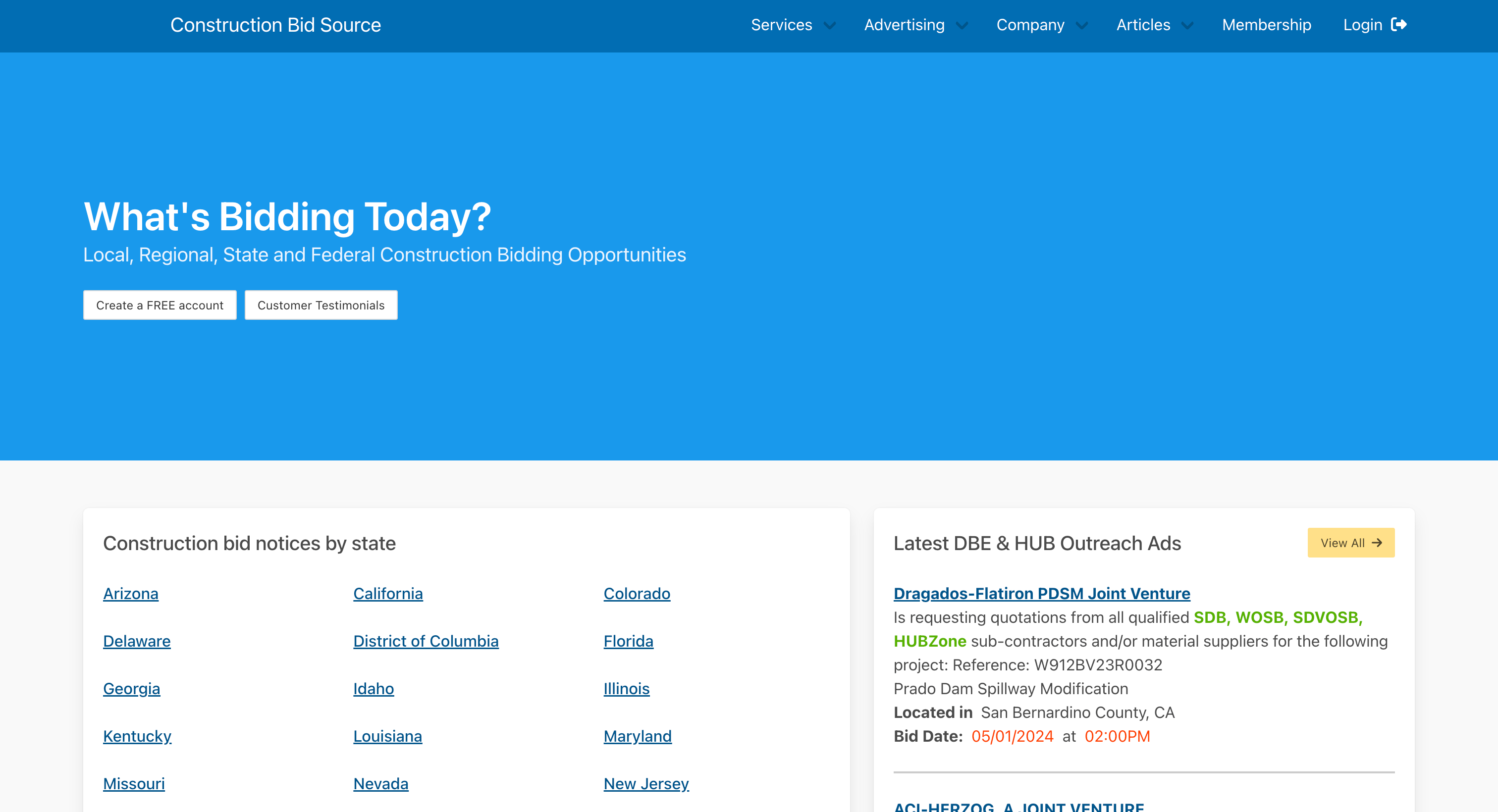
6. PlanHub
Best for: General contractors and subs looking to connect on an all-in-one bidding platform. PlanHub is a cloud-based preconstruction platform where GCs can post project invitations for free, and subcontractors can find and bid on projects in their area. It emphasizes easy file sharing and communication through the bidding cycle.
Key Features:
- Project Posting & Bid Submission: GCs post projects (plans, specs, etc.) and subs can review all details and submit bids electronically through PlanHub, streamlining the entire bid exchange.
- Project Discovery for Subs: Subcontractors get notifications of new projects that match their trade and region, making it easy to discover work without extensive searching.
- Central Communication Hub: All project messages, updates, and file addenda are centralized so GCs and subs stay on the same page throughout the bidding process.
Pros:
- Simplifies bidding by handling invite distribution, bid submissions, and updates in one place.
- Provides bid status updates for subs (know if the bid is viewed or if the project was awarded).
- Helps match subcontractors with relevant projects, saving time finding opportunities.
Cons:
- The free plan is only for GCs; subcontractors must pay to actively bid on most projects, which can be a barrier for very small subs.
- Subs cannot easily see how many competitors are bidding or who they are (limited visibility into competition).
- Mobile app functionality is somewhat limited compared to the desktop experience.
Pricing: General contractors can use PlanHub for free to post projects and solicit bids. Subcontractors, however, need a paid subscription to fully utilize the platform. Annual subcontractor plans range roughly from $1,199 up to $2,999 (depending on the geographic coverage radius you want). Exact PlanHub pricing can be tailored by contacting with the sales team.
![]()
7. BlueBook
Best for: Contractors seeking networking and lead generation through an established industry platform. The Blue Book is a long-standing construction network that has evolved into a project leads and bidding platform. It connects general contractors, subs, and suppliers, and provides tools to manage project communications and bids.
Key Features:
- Targeted Project Searches: Users can filter projects by location, size, trade, and other specs to find opportunities that fit their business.
- All-in-One Platform: BlueBook provides a central hub to access project plans, communicate between GCs and subs, and manage bid submissions, reducing the need for separate emails or file shares.
- Daily Updates & Alerts: Automated notifications inform users of new projects or updates to invited bids, keeping your pipeline fresh and up-to-date.
- Extensive Network: Taps into the Blue Book’s vast network of contractors and subcontractors, helping GCs find reliable subs and subs find reputable GCs.
Pros:
- Streamlines workflow by combining project discovery, document access, and communication.
- Good for targeted lead finding, thanks to robust search filters and daily alerting.
- Leverages a large industry network built over many years, which can lead to quality connections.
Cons:
- The platform offers limited features on the free tier; most useful features require a paid plan.
- Pricing is not transparent online (hidden pricing means you need to talk to sales for details).
- Some users report a learning curve due to the range of features and the need to familiarize with BlueBook’s interface.
Pricing: BlueBook provides a basic free membership to get started, but to unlock full lead and bid management features you’ll need a paid plan. Specific pricing is not publicly disclosed – interested firms should contact The Blue Book Network for a customized quote on premium plans. Learn more about pricing for Blue Book construction here.
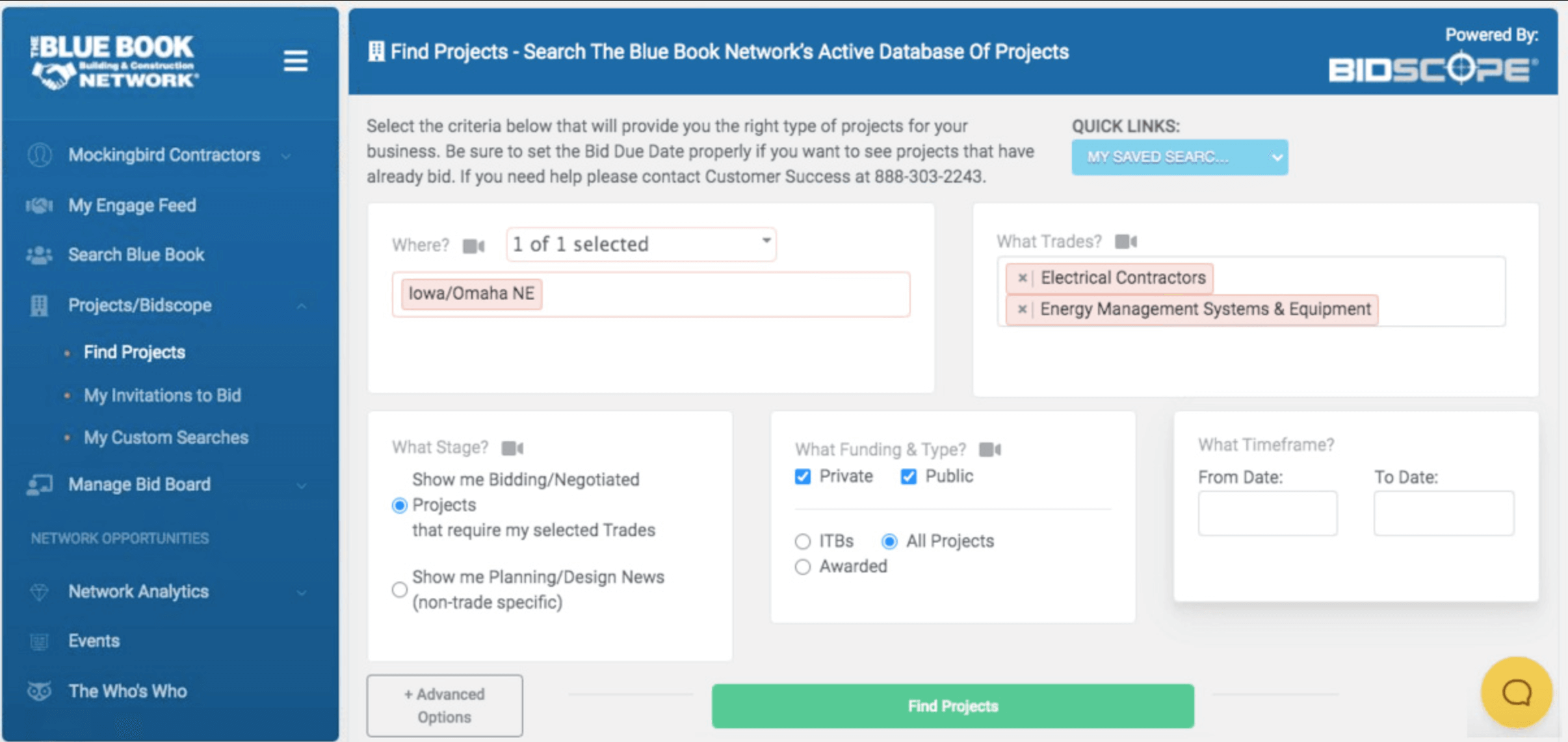
8. Procore
Best for: Large contractors or those needing an all-in-one solution. Procore is a powerhouse construction management platform widely used for project management, and it includes robust bidding capabilities. It’s ideal for general contractors managing complex projects who want bidding integrated with their project workflow (and don’t mind an enterprise-level system). Click here to learn more.
Key Features:
- Centralized Bid Management: Create bid packages, send invitations to your database of subs, and receive bids directly in Procore. You can then compare bids and award contracts within the platform.
- Document & Plan Management: Store and share all project documents (drawings, specifications, addenda) in real-time. This ensures bidders are working off the latest plans and can collaborate via markups and comments.
- Field & Project Management Integration: Bidding ties into Procore’s broader project management suite – meaning once a bid is won, you can seamlessly transition to project execution (tracking progress, field updates, etc.) within the same system.
Pros:
- Enables data-driven decisions with its reporting and analytics across bidding and project performance.
- Truly an all-in-one solution – you get bidding plus project management, finance tracking, and more in one platform.
- Improves collaboration and reduces errors by having everyone (office and field) work in a unified system.
Cons:
- There is a significant learning curve, especially for smaller teams, given the software’s vast capabilities.
- Integration with non-Procore tools can be tricky (though Procore has many integrations, it works best if you commit to its ecosystem).
- No transparent pricing or self-serve signup – and only a limited trial – which can be a hurdle for evaluation. It’s also known to be a premium-priced product.
Pricing: Procore offers different packages tailored to main contractors, subcontractors, owners, or government projects. Pricing is enterprise-level and not published; you must contact Procore for a custom quote. (Typically, pricing depends on the volume of projects and modules needed.)
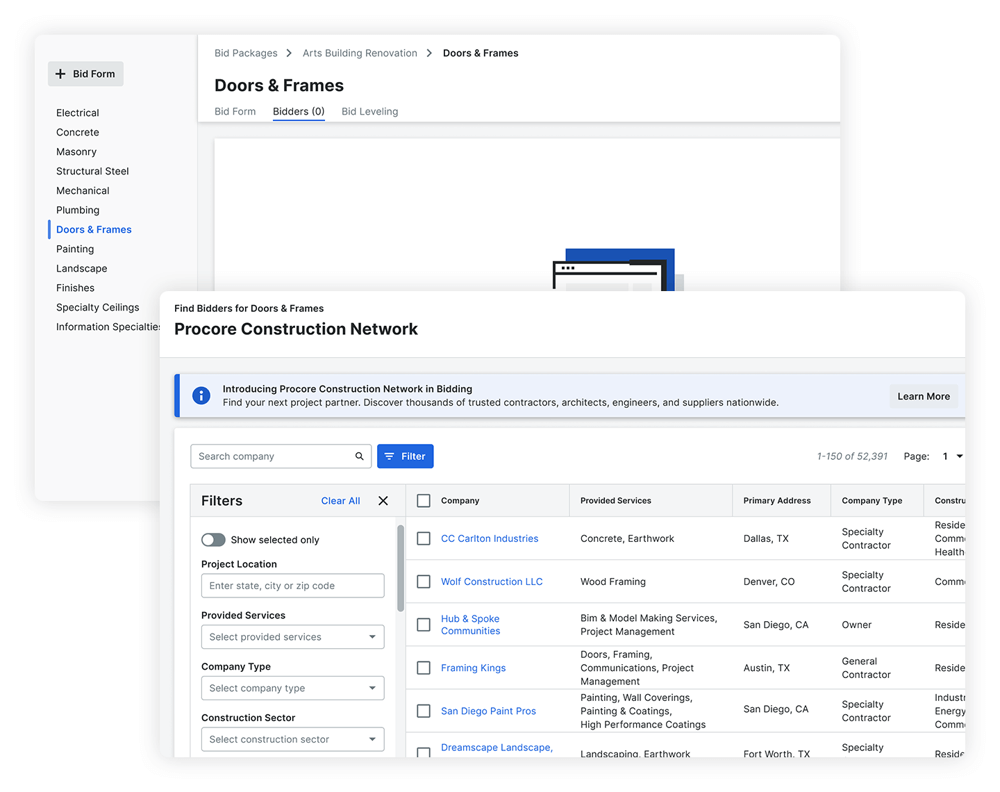
9. PlanSwift
Best for: Estimators and contractors who need fast digital takeoffs as part of the bidding process. PlanSwift is actually an estimating/takeoff software rather than a bid invitation tool. It excels at letting you measure and quantify plans electronically, which is crucial for preparing accurate bids on construction jobs.
Key Features:
- Digital Quantity Takeoffs: Easily measure lengths, areas, and counts on digital blueprints (e.g. count fixtures, measure wall lengths) to calculate material and labor quantities needed for a bid.
- Reporting & Export: Generate detailed takeoff and material reports that can be exported or integrated into your estimating spreadsheets or software, ensuring your bid numbers are well-supported.
- Specialized Tools: Offers tools like linear and area measurement, drag-and-drop parts (for assemblies), and even some BIM integration, making takeoffs much faster than doing them manually.
Pros:
- Speeds up takeoffs dramatically, allowing for faster and more accurate estimating than paper-based methods.
- Works offline and doesn’t require constant internet access once installed – handy for on-site or on-the-go work.
- Intuitive interface for those familiar with blueprint reading; most users can get the hang of it quickly.
Cons:
- Lacks bid management features (PlanSwift handles the estimating piece, but you’ll use another tool to send/receive bids).
- Not ideal for very large or complex projects that might require advanced BIM integration – manual data entry may be needed for some 3D models.
- Mobile functionality is limited – it’s primarily a desktop application, so field use on tablets is constrained.
Pricing: This software is sold as an annual subscription. PlanSwift's pricing is around $1,749 per year for a license, which includes software updates, support, and a couple of hours of training. (They often allow a trial or demo before purchase.)

10. SmartBid
Best for: General contractors focused on preconstruction bid management and subcontractor outreach. SmartBid (by ConstructConnect) is a dedicated bid invitation and management platform that helps GCs organize their subcontractor database, send bid solicitations, and collect bids securely. It’s a well-established tool in the precon space.
Key Features:
- Subcontractor Pre-Qualification: Manage a database of subs and prequalify them by criteria like trade, project history, safety records, etc. This ensures you invite only qualified subs to bid on projects.
- ITB Distribution & Tracking: Easily send out bid invitations to selected subs, then track responses, addenda acknowledgments, and bid statuses all within the platform.
- Document Management: Share project documents (plans, specs) with invited subs through a secure portal. Subs can upload their bids and any RFIs or communications can be tracked in the system.
Pros:
- Integrates with other construction apps (including Procore, Bluebeam, etc.) to extend its functionality and fit into your workflow.
- Offers training and support to help new users get up to speed, which is useful for larger teams adopting it.
- Highly customizable dashboard and reports, so GCs can tailor what information they see (bid status, coverage, etc.).
Cons:
- The mobile application is limited; most users will use the web interface for full functionality.
- No public pricing info – the lack of transparency can be frustrating when budgeting.
- It’s not the cheapest solution on the market; costs can add up especially for large teams (priced per user).
Pricing: SmartBid uses tiered pricing based on the number of users and company needs. Pricing is not advertised publicly. Prospective users must contact the SmartBid sales team for a quote. (As a rough idea, industry chatter suggests it’s priced in the range of a few hundred dollars per user per year, but your mileage may vary.)
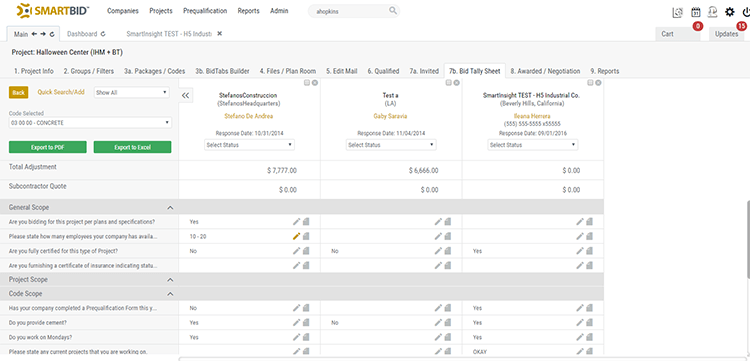
FAQs
Q: How do I choose the right construction bidding software for my contracting business?
Consider your role and needs first. General contractors may prioritize tools with strong invitation-to-bid features and subcontractor management (e.g. BuildingConnected, SmartBid, Procore). Subcontractors might focus on platforms that aggregate project leads and simplify bid tracking (e.g. Downtobid's Bid Board, PlanHub, BlueBook). Evaluate key features: need just a simple bid tracking tool or an all-in-one solution with estimating and project management? Factor in ease of use (something your team can adopt quickly) and integrations with existing software. Think about budget and pricing transparency -- enterprise tools require bigger investment, which should align with your project size and expected value.
Q: Are there free or affordable construction bidding tools available?
A: Yes, some options offer free/low-cost tiers. Construction Bid Source lets you browse some projects free (paid plans for full access) and PlanHub allows GCs to post projects free (subs pay to bid). BlueBook has a free basic network listing, though advanced features cost extra. Top tools like BuildingConnected, SmartBid, and Procore don't have free versions, but may offer trials or demos. If budget is a major concern, start with a free lead service or lower-cost tool and upgrade as you grow. Always weigh cost against time saved and potential to win more bids through effective software use.